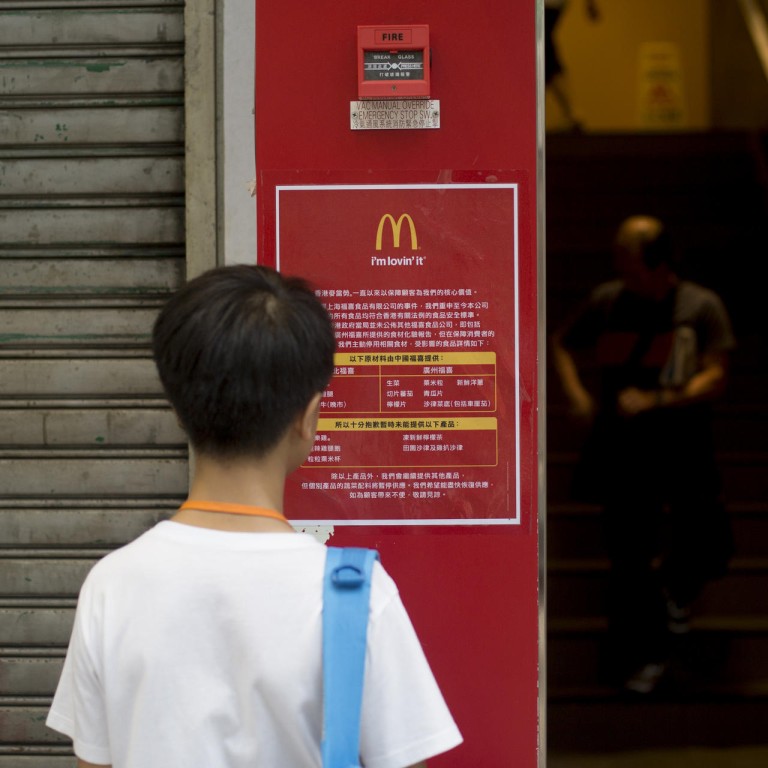
McDonald's shows just how easy it is to make things worse
The dismal example of how McDonald's Hong Kong handled collateral damage from the Husi food safety scandal shows it is always possible to make a bad situation worse
Collateral damage is a terrifying thing, a concern accentuated because it stems from events that tend to be beyond your control.
However, as the dismal example provided by McDonald's in Hong Kong shows, it is always possible to make a bad situation worse.
The collateral damage in this instance relates to revelations about the appalling lack of food safety standards at Shanghai Husi Food.
It is safe to assume that this company is in very big trouble, but its problem has now become an issue for its customers, even though they bear no responsibility for Husi's apparent negligence.
Husi was a meat supplier to McDonald's and other well-known fast-food chains.
There is no doubt that these companies were very put out by the revelations of what went on in the Husi factory. They assumed that as it was under the umbrella of a big international corporation, it could be trusted.
Simple and straightforward works best in these circumstances
The trust was clearly misplaced, but, frankly, none of this is of much interest to the people who are the customers of Husi's customers.
Their relationship is confined to the folks who take their money in return for food. Anyone with half a brain understands this and will appreciate that there is limited patience for companies who spend time on the blame game when they should be devoting their energies to fixing the problem.
It staggers belief that McDonald's in Hong Kong decided to address understandable public concern by initially denying that there were any problems with its chicken and pork supplies; this was followed by a belated admission that there might indeed be some problems necessitating the withdrawal of a number of items from its menu.
The company then decided that silence was the best policy. However, as criticism mounted, it called a second press conference lasting four minutes at which no questions were entertained and a brief statement of apology for "miscommunication" was read out. Now it has ceremoniously handed over its stocks of Husi supplies for burning.
Other companies, notably Marks & Spencer, took a proactive approach, saying that although they were not sure whether certain food items had been contaminated, they judged it prudent to withdraw these items.
Meanwhile, as ever in these situations, busybodies are poised for some grandstanding and meddling in matters they only vaguely understand.
It brings to mind the experience my company previously had when operating a coffee shop in a university where catering oversight was the responsibility of a finance officer who scoured the papers for reports of catering problems and then demanded that we "prove" that we didn't share these problems.
She was, of course, covering her backside rather than thinking sensibly about how to ensure food safety.
So what tends to happen when collateral damage sets in is that not only are there real problems but also a whole layer of imagined problems created by time-wasting bureaucrats.
This is all desperately unfair, but there is no point complaining, because bureaucrats cannot be wished away - they need to be tackled.
At this point, with problems mounting, many large companies summon in alleged crisis control experts. They are unlikely to suggest a minimal response, because they need to justify their existence with an array of strategies, flow charts and all manner of fancy PowerPoints that suggest that common sense can be replaced by some kind of voodoo-like science affirming their expertise. If anything, they tend to slow down action when a rapid response is required.
In this instance, think how much better it would have been if McDonald's had immediately withdrawn all products emanating from this factory, had speedily communicated this fact to its customers and pointed out, which seems to be the case, that there are no cases of food poisoning arising from this debacle. I can't supply a fancy flow chart to accompany this rather simple proposal for crisis management. However, I can say with confidence that you don't need hindsight to appreciate that simple and straightforward works best in these circumstances.
I suspect that some companies affected by the Husi disaster took the view that they were unfairly sucked into a problem that was not of their making and thought there was more wriggle room than really existed. Unfortunately business, like life itself, is not fair, and you have to deal with things regardless of how they arise.
The fallout from Husi is undoubtedly serious, but if you really want to understand just how bad collateral damage can get, ask Malaysia Airlines, which is now dealing with its second crisis in the space of four months, burdened with fatalities caused by a conflict far removed from home and beyond the airline's control but unavoidably requiring swift action from the company.

